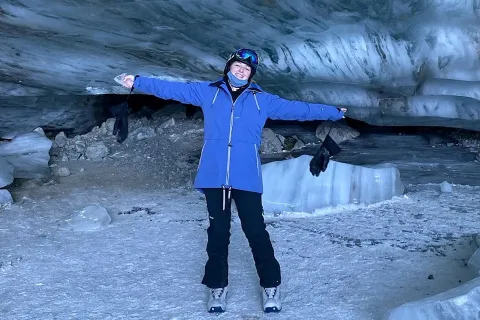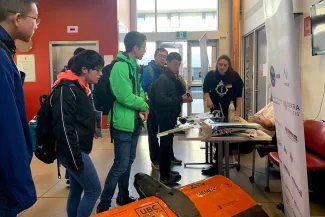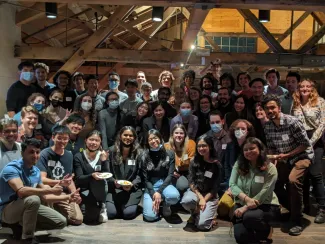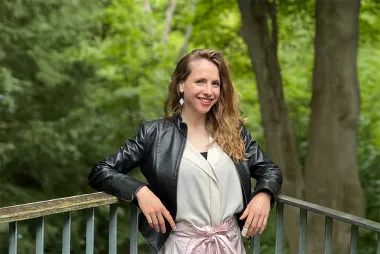"Try everything once. You never know where the people or passions in your life will come from."

Darci May Nesbitt
- Degree:
- Bachelor of Applied Science
- Grad year: 2022
- Program:
- Campus: Vancouver
I didn’t have a terribly traditional upbringing. At this point, I have lived in five different countries in very different parts of the world. I hold citizenships in three different countries and wouldn’t really call any of those places home. For the last five years, UBC has made an impact on my life and has allowed me to make it my home. A large part of my time here has been taken up being a part of the student government for the Integrated Engineering Program, where I have been the 2nd year representative, the Vice President of Student Life, the Vice President External, and finally, the President. I spent two years on the UBC Aerodesign Team, ending my time there as the Propulsions Sub Team Lead. I also spent a year working with Third Quadrant Design and a year in the equestrian club. In the last two years of my degree, I was a teaching assistant for first-year engineering students in APSC 100 and 101. I also completed an 8-month Co-op at Ledcor in their telecommunications division. Outside of my life at the university, I love to be creative. I love any form of creative expression, though my favourites would be painting or my guitar. In the winter, you can find me up on a mountain any time I can get there, and you can also find me in a spin studio multiple times a week.

Why did you choose to go into your field of study at UBC?
I have never been a person that has fit into one singular ‘box’. My interests, skills and aspects of my personality tend to vary. I have a lot of fun with this aspect of myself, but it made choosing what to do at UBC quite challenging. Many of my friends in first year knew what aspects of engineering they found the most interesting from the get-go. I really struggled with this as I could point to parts of most engineering disciplines that I found interesting in some regard. I also did not think that I knew enough about any of the programs to make the type of decision that would impact the rest of my life.
I chose Integrated Engineering (IGEN) for the primary reason that the program would allow me to ‘taste-test’ most of the engineering disciplines at UBC and then make a more informed decision for my major and minor. I was also attracted to the amount of self-guided project work that exists within the program, allowing groups of students to choose what they want to make and then providing them with the resources to make it.
What has made your time at UBC memorable?
Most definitely the people both inside and outside of my program. With UBC being the size that it is, it attracts people from all over the world. I think that one of my favourite things about my time at UBC is getting to meet so many different people that have so many different stories. Some of my closest friends that I met at UBC are ones that have no relation to my academic program whatsoever. I also have really valued the number of opportunities that exist for upper-year students to interact with lower year students. I found a lot of value in my work as a teaching assistant for a first year engineering class as it really made me consider what I had learned in the last few years, and assess things that had gone well and things that hadn’t.
Tell us about your experience in your program. What have you learned that is most valuable?
One of the aspects of IGEN that I have enjoyed the most over the years has been learning many different types of engineering and then using those to approach project work in different ways. Because our program is relatively open when it comes to course requirements, no two students have the same class pathways to graduation. This means that when we all come together for our second, third and fourth year projects, there are so many different perspectives and approaches to problems. One of the most valuable things my program has taught me is that all different kinds of people can bring value to a team. The different perspectives they provide can sometimes be the most effective way to problem solve.

What advice would you give a student entering your degree program?
Regardless of what other people tell you, give everything a chance. I know people who have found their passions in subjects that most other students in the program had considered to be a write off. The best thing you can do in IGEN, engineering and just University, in general, is to expose yourself to as much as possible. We are rarely, in life, given the chance to try so many new things and just learn about new subjects, and ourselves.
Specifically for IGEN, I would also say to rely on your friends and program advisors. The program is known for having a great community, use it and the resources it provides for you. Upper year IGEN students are your best source of information and your best example for what is possible.
Where do you find your inspiration for using your degree to make an impact on our world?
My biggest inspirations would be my parents, my family and my friends. My parents have always taught me to try and leave a positive impact, whether that’s on the world, the environment, or the people around me. My various family members have shown me how many different ways there are to be authentically yourself. My friends are all going off to make their impacts on the world in their own unique ways and it inspires me to go out and find my own way to do that.
What are some contributions you would like to make when it comes to the future of work in your field?
Currently, I am heading off to Mexico for 6 months to work in Marine Conservation and to also get my PADI Divemaster qualification. I really want to find work that I feel has a positive impact on the world, and right now I think that that is in conservation and climate change. I don’t know exactly what my field will be, but I would like to use the skills I learned in my engineering degree to try and mitigate some of the impacts of the engineering decisions of the last few decades that were made without consideration of the environment.



